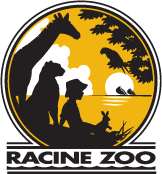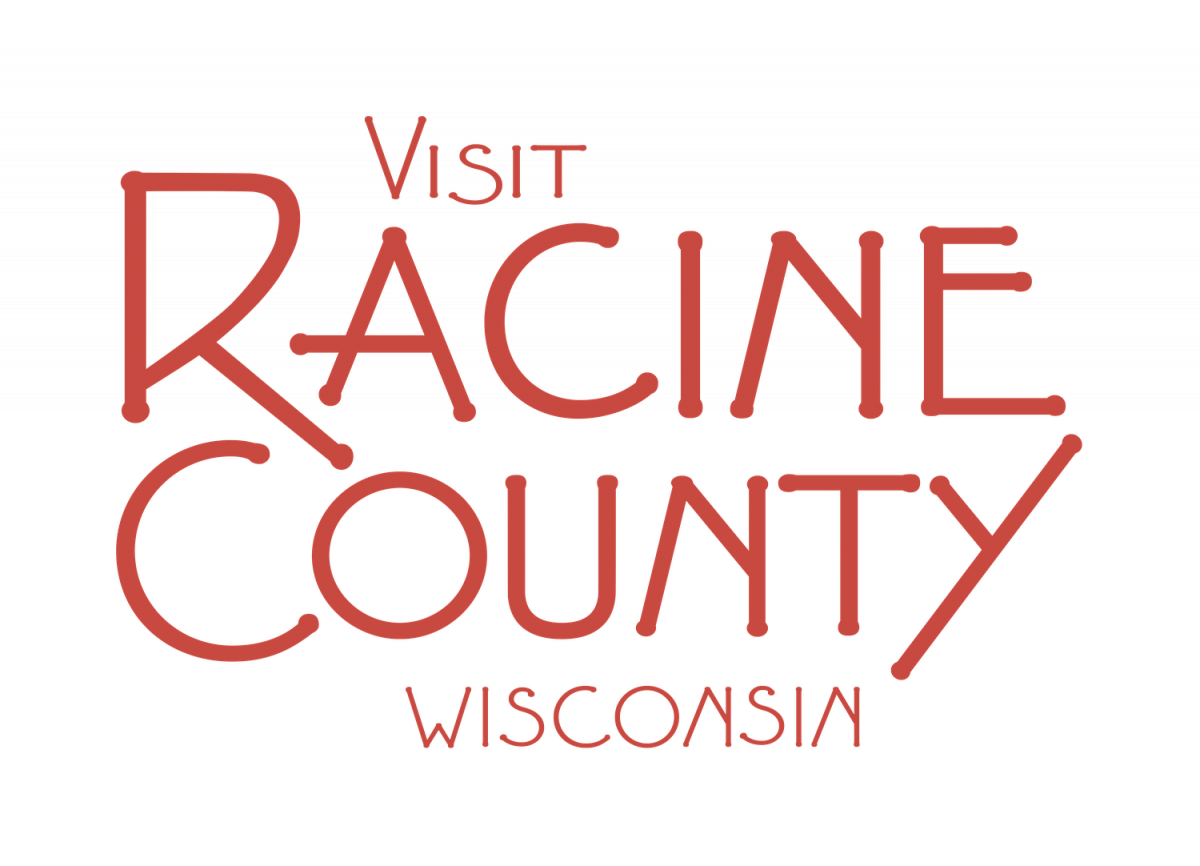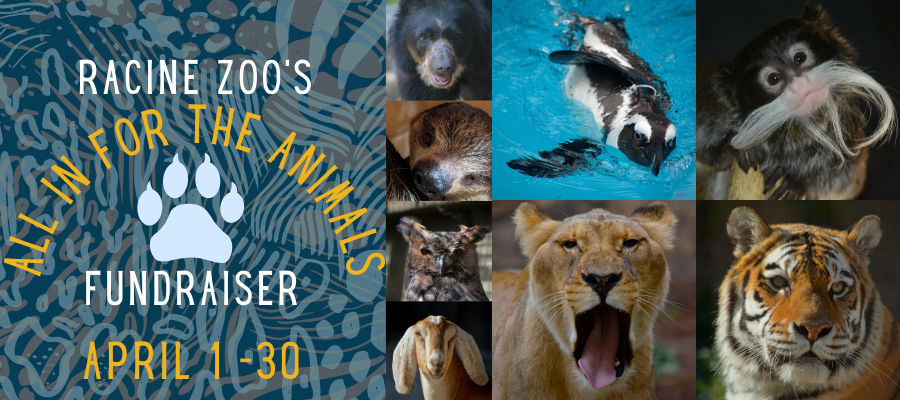

All throughout the month of April, we would like to ask you to reach into your hearts and help the Racine Zoo make a difference for our animals. Our Animal Care Department provides essential daily and specialized care to over 300 animals and 75 unique species that make your trip to the Zoo so memorable. Racine Zoo is accredited by the Association of Zoos and Aquariums, which means we are held to the highest standards of animal care. For a nonprofit like Racine Zoo, it is a steep price tag to maintain this level of care. Show your love for the Racine Zoo animals with a donation and help us make the biggest impact possible this month!
Our goal for All In For The Animals is to raise much needed funds for the Zoo. Will you help us make this possible? A gift of any size makes a difference.
Because of our sponsors, this year your tax-deductible donation will have TWICE the impact! Every dollar donated up to $5,000 will be matched by RUUD Family Foundation. Thank you to our wonderful Zoo patrons and thank you for helping Racine Zoo animals.
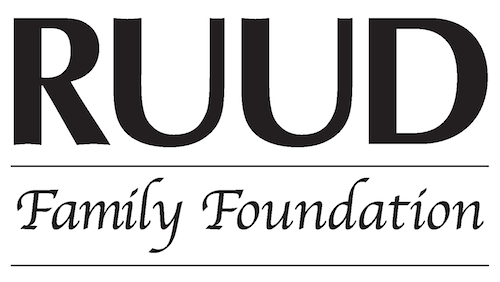
Donate online below or mail your donation check to the Racine Zoo at 200 Goold Street, Racine, WI 53402. All donations are tax deductible in accordance with the IRS Tax Code.

A sincerest thank you for your consideration from all the animals and staff at the Racine Zoo. Your incredible kindness will go a long way.

Donors play a crucial role to keep our 100-year-old zoo running. Through the generous support of the community, Racine Zoo can continue to provide our beloved animals with the care they need. Our mission is to educate and inspire our guests and the community while providing an affordable wildlife experience that improves the bond between people and nature for years to come. In addition to specialized veterinary care, our animals need to eat! Our keepers craft specific diets for each animal to keep them healthy and strong. However, since the animals require food every day just like you, the cost adds up quickly!





Missy On The Move
Animal arrivals are always an exciting time at the Zoo. Many visitors don’t realize it, but each animal that arrives is required to spend some time “in quarantine,” where they are checked and tested for various illnesses (and treated if needed!) before meeting new enclosure-mates. When in quarantine, animals are able to adjust to the new Animal Care staff; Missy quickly became a staff favorite, and a joy to have at the Zoo. Missy’s quarantine was a bit different than most, as she had even more time to get to know her keepers (3 months more!).
After the regular set of quarantine testing was completed, Animal Care staff noticed that there would occasionally be small drops of blood in Missy’s quarantine habitat. Missy seemed fine, and staff could not find any external source to explain what was being found.
Further investigation was warranted, and a complete exam was given to Missy (under sedation). During this exam, x-rays, bloodwork, and an ultrasound were performed, and the ultrasound found the issue. Missy had significant “uterine abnormalities”.
Racine Zoo’s Veterinarian (who very much loves sloths!) reached out to other veterinarians whose expertise is treating sloths, to discuss treatment options. After reviewing the findings it was determined that Missy needed a hysterectomy to remove the suspected mass/abnormalities. Missy had a successful surgery and recovery in our holding facilities, and afterward was able to make her way up to her new home on exhibit on the Main Floor, next to the Lar Gibbon exhibit.

Inti, A Bear-y Good Student
Racine Zoo regularly receives new residents from other Association of Zoos and Aquariums (AZA) institutions. When they arrive, they often know a variety of behaviors that Animal Care staff use to allow the animals to participate in their husbandry care. From hoof trims to blood draws and everything in between.
Our Andean Bear resident, Inti, arrived as a young bear, and as such, knew relatively few behaviors. Undaunted, the Large Cat and Bear Care staff quickly began training sessions with Inti to reaffirm behaviors he already knew. Staff began to teach Inti behaviors that help us to provide great care every day. Inti has learned recalls to the dens that let him know his lunch or dinner is ready, shifting from one den to the others to allow for proper cleaning, and targeting, so that he can pose a specific way allowing us to check for scrapes and see his body condition.
Inti is an excellent student, and quickly learns new behaviors expanding his behavior repertoire quickly, allowing for voluntary weights and other behaviors!


Empathy Ethograms
This year at the Zoo, you may have noticed new signage at several of the habitats. Through funding from the Advancing Empathy grant, QR code signs were deployed around the Zoo at select animal habitats. Guests can scan the sign, answer some questions, and earn a sticker at the Gift Shop for helping us out!
This project may seem simple and fun, but it has had a real impact on our animal residents. The QR surveys are ethograms—scientific surveys that help analyze animal behavior. By answering simple questions like “What is Changbai currently doing?”, you are collecting valuable data that helps our animal care staff improve the quality of life for our animals.
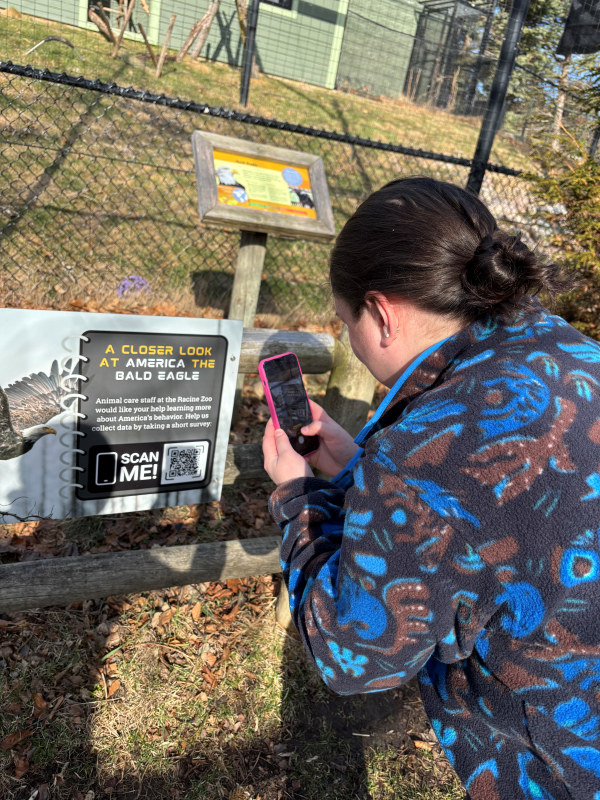
Take the rhinos—since COVID, our rhinos have seemed hesitant to go on their outdoor habitats, we believe in part because the crowd level greatly changed. This summer, our rhino care team tried many different things to encourage the rhinos to be outside. Data from Racine Zoo guests about if the rhinos were visible or not, and where they were hanging out in their habitat, helped the rhino team learn what enrichments were working well! Between June 9 and August 31, 2024, guests reported the rhinos being visible only 44% of the time. Between September 1 and December 31, 2024, after the rhino care team analyzed and implemented the rhinos’ favorite enrichments, guests reported the rhinos being visible 74% of the time! This 30% increase in the rhinos using their outdoor habitats is in no small part because our amazing guests have filled out these surveys. Quality of life has increased for the rhinos because of this project.
We have also found that these surveys tell us a lot about our guests and how they relate to our animals. The Racine Zoo is a partner organization of the Advancing Empathy for Conservation of Wildlife (ACE for Wildlife) that focuses on building empathetic connections with the natural world. The final question of the survey, “What did you learn about our animals today?” has given our teams great insight on the close connections our guests have with our animals. One response reads, “I also learned, by reading the Medical Notice, that [zebras] are a “skittish” species, which is perhaps why I’ve had a lifelong affinity for them: I’m highly anxious myself.” Our guests connect to animals at the Racine Zoo on a deep level that further shows how important it is to be out in nature and learning about animals.
This survey has also shown the incredible capacity the Racine Zoo community has for conservation. Another response says, “I learned that rhinos’ mental health...can take a huge toll due to changes in their environment and everyday life...if [Kianga] had high anxiety due to changes in his life...animals in the wild likely have a lot of stress when their environment and other animals are threatened due to poaching, deforestation, etc.” Connection with animals help us understand why it’s so important that we all take conservation action—from turning off lights when we aren’t using them, to donating to organizations like the Racine Zoo that help support wildlife conservation.
We have received 876 responses to our QR code surveys (as of March 16th, 2025). This project continues to support our animals, improve our understanding of their behavior, and build greater connections with our guests. Next time you visit the Zoo, stop by a QR sign and fill out a survey! Your responses matter and give great insight.
Supporting the Racine Zoo, whether through time, visits, or monetary donations, truly helps us be All In for the Animals. Our animals and the connections they create is what our Zoo is all about. Thank you for your continued support, and we hope to see you at the Zoo soon!







